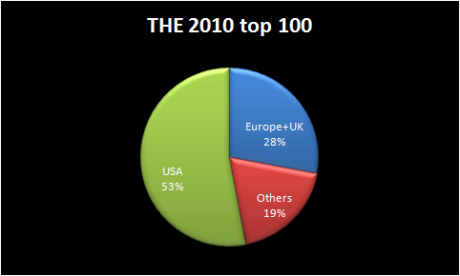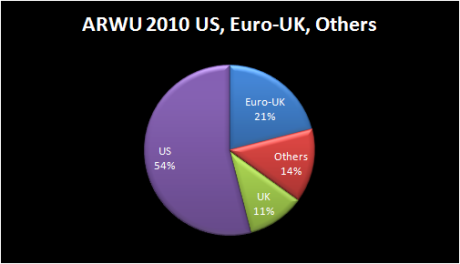News about university rankings has taken an International Relations twist as the EU has angrily criticized two recent rankings and has allocated funding to create a new system. This was in response to a very low ranking of European universities by the UK publication Times Higher Education, and the Shanghai ranking. Having an emerging superpower like China view Europe’s universities so poorly has led to some European education ministers and university presidents to travel to China and express their concerns and promote their universities. Unlike domestic rankings of US universities (we call them colleges : ) have, these international rankings bring the prestige of a nation’s entire higher education system into scrutiny. It makes sense for countries like Germany and France to fret over these results, as both rankings make their higher education systems appear to be inferior not just to the US model, but to one of the most eurosceptic members of the EU: Britain. The coalition government in Great Britain has been increasingly critical of European (read EU) integration, and the debt crisis has emboldened them continue to use a separate currency and avoid contributing to Eurozone bailouts (the UK is, by far, the largest EU member-state not to use the Euro). Lets see what these two rankings show:
Of the top 100 from the Times Higher Education, here are some results and analysis: (note: I am lazy so the colors don’t match, sorry)
Immediately it is clear that the EUs higher population and GDP (EU-wide, not Eurozone) does not produce as many top 100 universities compared to the US. But this shows only part of the problem.
Half of Europe’s top 100 universities are in the UK, an impressive feat for a country with a smaller economy and population than Germany. The United Kingdom’s GDP and population figures are very closely matched with France who does terribly on this graph. see my link above for complete results.
Finally, when we include Irish, Canadian, and Australian universities lets see how they perform, as the Anglosphere:
Once you include important universities in Canada, Australia and Ireland it appears that the world’s most desired universities are overwhelmingly English-speaking establishments. Perhaps this ranking system favors that unfairly, it is an independent publication, but it is also a British, independent publication. Russia once had a ranking system that appeared reasonable at first glance, until one found Russia’s own Moscow State University ranked higher than Harvard or Cambridge. Lets see how China’s ARWU or Shanghai Ranking rates the same regions.
The Chinese ranking or ARWU has been out since 2003, but it wasn’t until its recent battering of European universities was combined with the THE ranking for 2010 that Europe responded. Here are the same regions being measured by the 2010 ARWU/Shanghai Ranking: (note: I excluded Moscow State University from Europe because Russia’s relationship with the EU is different than Switzerland or Norway’s)
While Europe clearly does better in the ARWU ranking, the US still dominates the top 100.
Separating Britain from the EU has a similarly bad outcome for Europe, though its not as bad for Europe as the THE rankings showed. To break it down more thoroughly: France has 3 universities compared with Britain’s 11, while Germany has 5, and Switzerland somehow ties with France with 3.
Both the ARWU and THE rankings clearly favor English-speaking universities, with both giving them at least 70% of the top 100 in both cases. The ARWU ranking doesn’t rank Irish universities in its top 100, but does rank Canada and Australia’s universities with 4 and 3 respectively. While one might expect China’s East Asian rivalry with Japan to color the ranking’s view of Japanese universities, this isn’t the case: Japan features 5 universities in the top 100, with no Chinese institutions included. Rounding off the list is Russia’s Moscow State University and Israel’s Hebrew University.
The ARWU has also been criticized for favoring sciences much more than humanities, which might explain why many liberal arts colleges perform badly on this list.
Personally, I think ranking an entire university is an incomplete science at best. It’s easy to rank a university’s prestige, but sometimes that prestige doesn’t reflect a particular program’s strength at a university. For instance, Georgetown and Johns Hopkins both have highly esteemed schools of International Relations and Diplomacy but lack the similar prestige of MIT’s hard science programs, so they lose out in a ranking that favors hard sciences. I’d rather not split hairs ad infinitum over ranking systems and instead focus on the IR implications ofthe recent ranking system debacle.
European integration has been viewed by some of its proponents as a means for Europe to remain relevant in an increasingly multi-lateral world. Don’t just take my word for it, academics have written much about it. French and German politicians and academics have been especially eager to use the EU to promote this goal, and as a consequence, have been equally insecure over its prospects. While the Eurozone’s economy is smaller than the US, the entire EU membership has at least matched it recently. This has led outsiders and Europeans alike to eagerly await an example of European leadership. One of these much anticipated examples ended in spectacular failure at the 2009 Copenhagen Summit on Climate Change.
Europeans anticipated this would be a moment where their divergence with the US on climate change could help to underscore Europe’s relevance as an ec0-friendly alternative to US or Chinese dominance; this made the summit’s outcome exceptionally embarrassing. Prior to the opening of the summit itself was a smaller summit within the summit, where Obama negotiated with China as well as Brazil, India, and South Africa. After the summit appeared to be faltering, it was only efforts by China and the US to reconcile their differences with one another that was able to produce a final draft agreement. This was witnessed at the horror of EU enthusiasts, as it confirmed their worst fears of a world dominated by the G-2 (China and America). The fact that Europe’s failure at the summit may have been planned in advance can only add to the frustrations of European leaders. China’s importance at the summit put European aspirations of global leadership in doubt. The Eurozone debt crisis hasn’t helped matters, with Standard & Poor’s recently downgrading Greece’s sovereign debt to one of its lowest ratings.
It might seem like a poor ranking from two subjective lists shouldn’t bother European politicians and university heads as much as it has, but within the context of an increasingly desperate Eurozone debt crisis and a larger global shift towards the BRIC (the IMF predicts China’s GDP in PPP will overtake the US by 2016) it seems reasonable for such insecurities to exist.





